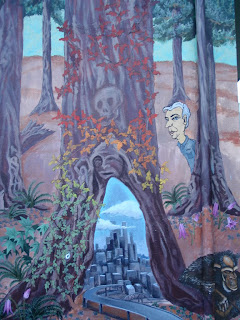 美國加州兩個保育團體19日表示他們已採取法律行動,要阻止國道101穿越紅杉林路段的拓寬計畫,因為此計畫威脅到李察遜森林州立公園(Richardson Grove State Park)中古老的紅杉林,並可能改變洪堡郡(Humboldt County)的鄉村特色。
美國加州兩個保育團體19日表示他們已採取法律行動,要阻止國道101穿越紅杉林路段的拓寬計畫,因為此計畫威脅到李察遜森林州立公園(Richardson Grove State Park)中古老的紅杉林,並可能改變洪堡郡(Humboldt County)的鄉村特色。
加州運輸局當天也發出正式公告,說明此計畫已獲通過,但承辦機關尚未發布最終的環境影響報告。
環保團體「環境保護資訊中心」(The Environmental Protection Information Center)與「生物多樣性中心」(Center for Biological Diversity)表示,這項道路計畫可能帶來大型商業卡車穿越環境敏感區域,他們將會奮力反對。
此公路計畫也遭當地居民、企業老闆、保育與原住民團體,以及經濟學家的反對,理由是此計畫實不必要,還會損及州立公園中尊貴的古老森林與其野生生物、旅遊業,以及洪堡郡的沿海社區。
「任何關心加州紅杉林與洪堡郡鄉村魅力的人應該都來阻擋這個災難性的計畫。」環境保護資訊中心李察遜森林行動協調人戴爾(Kerul Dyer)說:「州立公園裡的古老紅杉林應當受到全面保護,避免受到類似此次毀滅性計畫的傷害。」
「加州運輸局提出的這項計畫可能會摧毀古老紅杉的根系,並損及瀕危鳥類斑海雀的重要棲地。」生物多樣性中心保育主任加爾文(Peter Galvin)說:「我們已準備好要抗爭,並呼籲民選官員對運輸局施壓,撤銷這項計劃許可。」
加州運輸局與某些企業業者數十年來一直嘗試尋求要讓大型商業卡車穿越此區域,過去幾年內則推動拓寬國道101公路在此區狹窄且蜿蜒的路段,該公路在此穿越李察遜森林州立公園中的古老紅杉林。
「自遠古以來,這片森林對於在地的原住民部落居民具有重大的文化與精神意義,目前仍是如此,部落中有些人便追隨祖先腳步來到此地。」跨部落辛克灣原野協會(InterTribal Sinkyone Wilderness Council)主席杭特(Priscilla Hunter)這樣說道。該協會是10個聯邦承認的原住民部落所組成的聯盟,其反對此計畫。
保育人士堅稱,道路拓寬將讓大型零售商如沃爾瑪與家得寶(Home Depot)有誘因進駐洪堡郡,進而傷害當地企業。
加州運輸局則聲稱這項「更改」計畫是必要的,以便大型卡車安全行駛,不需再限制大型運具通過國道的這個路段,並可增進貨物的移動。
然而環保人士提出質疑,認為此理由顯然為加州運輸局自己的說詞,而此計畫路段的道路指示牌已經為大型卡車做好設計,加州運輸局也誇大了潛在的安全問題。
聯邦法律禁止交通運輸計畫穿越公立公園,除非在沒有可行替代路線的情況下。保育人士主張,既然小型商用卡車已經可以行駛穿越森林,將物資運送到洪堡郡,可行的替代方案就是讓公路保持現在這樣,並且完整保留住李察遜森林。
※譯註:加州運輸局20日發表最終環境影響報告,認定道路調整計畫不會嚴重影響環境,不會危害年份古老的紅杉與瀕危物種。此計畫將不會移植老樹,原先預計移植的樹木也將從89棵減為54棵。州立公園中所需移植的最大紅杉,直徑為7英吋。然而反對團體仍不能接受,並繼續籌備新一波的大型行動。環境影響報告網址:http://www.dot.ca.gov/dist1/d1projects/richardson_grove/
Two conservation groups today pledged a legal battle to stop a highway-widening project they say threatens the ancient redwoods of Richardson Grove State Park and could change the rural character of Humboldt County.
The California Department of Transportation, CalTrans, filed official notice today that the project was approved, but the agency has not yet issued its final Environmental Impact Report for the project.
The Environmental Protection Information Center and the Center for Biological Diversity say they will fight the road project that would bring larger commercial trucks through the sensitive area.
The highway project also is opposed by local residents, business owners, conservation and Native American groups, and economists as unnecessary and damaging to the state park, the venerable old-growth grove and its wildlife, tourism, and the coastal communities of Humboldt County.
"Anyone who cares about California's redwoods and the rural charm of Humboldt County should weigh in to stop this disastrous project," said Kerul Dyer Richardson Grove campaign coordinator for the Environmental Protection Information Center. "The old-growth redwood grove within the state park is supposed to be fully protected and not vulnerable to destructive projects like this one."
"The project as proposed by Caltrans threatens to destroy old-growth redwood root systems and harm critical habitat for the endangered marbled murrelet," said Peter Galvin, conservation director of the Center for Biological Diversity. "We're prepared to fight this and call on elected officials to pressure Caltrans to rescind its approval."
Caltrans and certain business interests have attempted for decades to provide access for larger commercial trucks through the area, and in the past few years have pushed for widening the narrow, meandering section of Highway 101 through the ancient redwood grove in Richardson Grove State Park.
"Since time immemorial, the grove has held, and still holds, great cultural and spiritual significance for local indigenous tribal peoples, some of whom trace their ancestry to this place," said Priscilla Hunter, chair of the InterTribal Sinkyone Wilderness Council, a coalition of 10 federally recognized Native American tribes that oppose the project.
The widening would provide an incentive for big-box retailers like Walmart and Home Depot to move into Humboldt County, to the detriment of local businesses, the conservationists maintain.
Caltrans claims the "realignment" project is needed to safely accommodate large-truck travel, remove the restriction of larger vehicles on this section of highway, and improve movement of commercial goods.
However, the conservationists argue, it appears from Caltrans' own statements and signage that the portion of road for which this project is contemplated is already designated for larger trucks and that Caltrans has exaggerated potential safety problems.
Federal law prohibits transportation projects on public park lands except in cases where there is no feasible alternative. The conservationists argue that since smaller-sized commercial trucks already travel through the grove to deliver goods to Humboldt County, one feasible alternative would be to leave the highway as it is and retain the integrity of Richardson Grove.




